
|
Astronomy Picture Of the Day (APOD)
 The Tarantula and the Supernova
The Tarantula and the Supernova
26.10.1995
In this close-up of the Large Magellanic Cloud, the spidery looking nebula on the left is fittingly known as as the Tarantula nebula. It is an emission nebula surrounding a cluster of hot, young stars called the 30 Doradus super cluster.
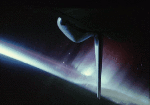 Aurora Astern
Aurora Astern
25.10.1995
Sailing upside down, 115 nautical miles above Earth, the crew of the Space Shuttle Endeavour made this spectacular time exposure of the southern aurora (aurora australis) in October of 1994. The aurora, also known...
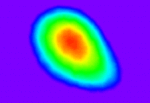 Painting with Solar Neutrons
Painting with Solar Neutrons
24.10.1995
Solar flares are propelled high above the Sun's surface by powerful, twisted magnetic fields. The flares spew high energy atomic and subatomic particles into space. During an intense solar flare on June 15, 1991, a spray of solar neutrons was detected by the COMPTEL instrument onboard NASA's Compton Gamma Ray Observatory.
 A Total Solar Eclipse
A Total Solar Eclipse
23.10.1995
Pictured above is a total solar eclipse, with the Sun's corona, clearly visible surrounding the Moon. This picture is a composite of differently exposed photos of an eclipse that occurred on July 11, 1991. Today there will be another total eclipse of the Sun, the last until March 1997.
 Gamma-Ray Quasars
Gamma-Ray Quasars
22.10.1995
Gamma rays are more than 10,000 times more energetic than visible light. If you could "see" gamma rays, the night sky would seem very different indeed. The bright object in the center of the false color gamma-ray image above is quasar 3C279, a nondescript, faint, starlike object in the visible sky.
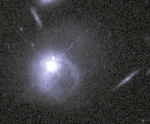 A Quasar-Galaxy Collision?
A Quasar-Galaxy Collision?
21.10.1995
In 1963 astronomers were astounded to discover that certain faint, star-like objects have very large redshifts. The large redshifts imply that these objects, now known as quasars (QUASi-stellAR objects), lie near the edge of the observable Universe.
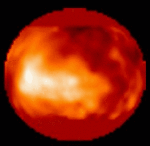 A Glimpse of Titan's Surface
A Glimpse of Titan's Surface
20.10.1995
The surface of Titan, Saturn's largest moon, is normally hidden from view by its thick, hazy atmosphere. However, for the first time astronomers have been able to see surface features in images like the one above, made at near-infrared wavelengths with the Hubble Space Telescope.
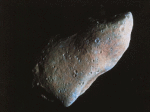 Asteroid Gaspra's Best Face
Asteroid Gaspra's Best Face
19.10.1995
Above is the best yet color image of the asteroid Gaspra based on data returned by NASA's Galileo spacecraft. Color variations have been added to high resolution images and enhanced to highlight changes in reflectivity, surface structure and composition. The illuminated portion of the asteroid is about 11 miles long.
 Globular Cluster M5
Globular Cluster M5
18.10.1995
The globular cluster M5, pictured above, contains roughly 100,000 stars. These stars formed together and are gravitationally bound. Stars orbit the center of the cluster, and the cluster orbits the center of our Galaxy. So far, about 160 globular clusters are known to exist in a roughly spherical halo around the Galactic center.
 A Storm on Saturn
A Storm on Saturn
17.10.1995
The white wisp shown on Saturn's cloud tops is actually a major storm system only discovered in December of 1994. Saturn's clouds are composed of primarily hydrogen and helium, but the storm's white clouds are actually ammonia ice crystals that have frozen upon upheaval to the top of the atmosphere.
|
January February March April May June July August September October November |
|||||||||||||||||||||||||||||||||||||||||||||||||